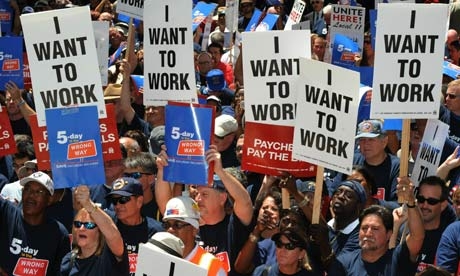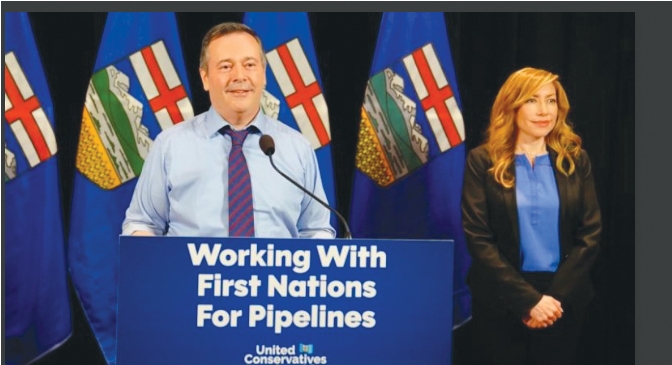
The Politics of America’s Economic Decline
America’s economic crisis is showing no signs of abating. Late last week it was announced that no new jobs were created in the month of August. The most recent figures suggest over 14 million Americans are jobless; the real figure is undoubtedly much higher. Panic grips the stock market every second day or so. The U.S. housing market remains depressed in many pockets throughout the country. Perhaps most distressing of all, governments seem either ineffectual or simply powerless to address the economy’s chronic problems. It wasn’t until a few weeks ago that Congress finally passed a motion to raise the debt ceiling. But even that measure has done little to inspire confidence among either businesses or regular citizens. Nor have the Federal Reserve’s relatively tepid measures done enough to stimulate any sort of real recovery. President Obama will address the nation on Thursday of this week with a new jobs creation plan. But few anticipate the sort of initiatives that will dramatically stimulate job growth and thus reduce unemployment. Many Americans are no doubt feeling hopeless about the country’s economic future.
Though it’s no longer in vogue to think so, the crisis is in keeping with what Karl Marx anticipated and John Maynard Keynes understood had to be corrected if capitalism wasn’t going to collapse under the weight of its own contradictions. America’s economy is suffering from a classic combination of high rates of joblessness and insufficient consumer demand. The two problems are self reinforcing. Slumping consumer demand undermines the incentive to hire more workers, which, in turn reduces demand even further. The crisis has been prolonged in part because of the preceding collapse of America’s housing market. An over inflated market was cause and consequence of too many Americans being over leveraged. Once housing prices started their precipitous decline, personal indebtedness also increased. Record numbers of foreclosures is the most dramatic symptom of the housing market’s collapse. Another has been to further depress consumer demand. So long as this remains so, job growth will remain anemic. It’s a vicious circle.

As Keynes understood, In such scenarios governments must assume a more active role in stimulating job creation if recessions are to be avoided. Contrary to what most Republicans suggest, there are ways of doing so that are fiscally responsible. As many economists have argued, the housing market’s collapse will continue to play a central role in keeping America’s economy mired in recession like conditions. Mitigating its effects will thus require some sort of mortgage relief for distressed home owners. Investments in necessary infrastructure programs should be forthcoming. Companies should be given strategic incentives to hire more workers. Getting most of America’s millions of unemployed back to work will remove an important drag on the system. Instead of collecting employment insurance or welfare, they will be paying taxes. In the case of America, fiscal responsibility must ultimately entail tax increases for the most wealthy. (Warren Buffet, one of America’s richest citizens, recently stated that he and others in his income bracket should be paying far more in taxes.) As the economy grows, reducing the deficit in a responsible fashion is much easier.
For members of the Tea Party and most Republicans, however, the jobs crisis is at best of secondary importance. Instead they insist that the country’s economic problems all more or less stem from an over reaching, over spending government. A combination of deep spending and tax cuts, from their perspective, is thus the only viable path towards economic recovery. Towards this end, the Republican controlled House refused to raise the debt ceiling until the threat of default seemed perilously real and President Obama agreed to their very disagreeable package of demands. Among other things, the president agreed to immediate and back loaded spending cuts.

President Obama and his team of economic advisers are smart enough to know that such measures will only exacerbate the country’s unemployment problem. But somewhere along the way Obama seems to have lost his nerve. He has too readily capitulated to Republican demands, in part because the GOP controls the House of Representatives. His capitulation is most reflected in the narrative he constantly invokes in explaining what his administration must do. Too often Obama refers to the very misleading analogy of the government being like a “family” that must “tighten its belt” and “reign in uncontrolled spending.” But like it or not, the government is not like a family. On the contrary, its responsibilities are different and far greater in scope. In addition to sound financial management, they involve generating conditions conducive to higher employment and protecting the air we breathe and the water we drink. In supposedly democratic countries, they have a profound responsibility to nurture democratic approaches to problem solving. Besides families wouldn’t be living in homes or buying vehicles or other large scale items if they weren’t themselves going into debt. This is why financial institutions issue mortgages and lines of credit. President Obama should be more forthright with American citizens and find more effective analogies when describing what his administration must do to improve the country’s prospects.
But for all of the Obama administration’s failures, it is highly misleading when equal blame is assigned to both the Republicans and the Democrats for the dysfunction in Washington or the prolonging of the economic crisis. On the contrary, the sources of the toxicity hanging over American’s capital can almost all be attributed to the Republicans and their Tea Party members. Their approach to the economy has been to hold it at ransom as a way of advancing a very partisan agenda, namely, to ensure Obama is a one term president. Perhaps there’s an element of racism in their determination to sabotage his presidency. In any case, doing their part to sustain high levels of unemployment is their best chance of achieving their objective. The Tea Party and the GOP also seem intent on widening the gap between America’s rich and poor while simultaneously severely restricting the government’s capacity to address the country’s problems. For this is what a combination of deep spending cuts and tax cuts amounts to. Yet they talk as though their twin demands reflect virtue of the highest order. They are either very cynical or simply unaware of the extent of their extreme narrow-mindedness. When it comes to the Tea Party and most Republicans, it’s always hard to know.









